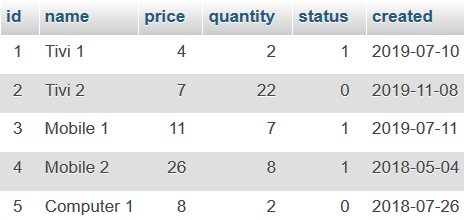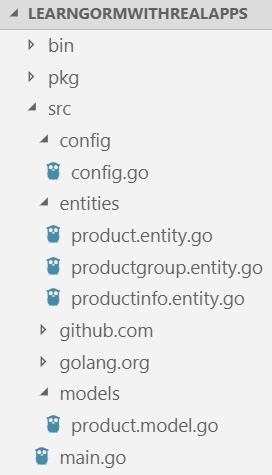Install Libraries
Make sure Git is installed on your machine and in your system’s PATH. Install the package to your $GOPATH with the go tool from shell:
$ go get github.com/go-sql-driver/mysql
$ go get -u github.com/jinzhu/gorm
Create Database
Create a database with the name is learngorm. This database have 1 tables: Product table.
--
-- Table structure for table `product`
--
CREATE TABLE `product` (
`id` int(11) NOT NULL PRIMARY KEY AUTO_INCREMENT,
`name` varchar(250) NOT NULL,
`price` double NOT NULL,
`quantity` int(11) NOT NULL,
`status` tinyint(1) NOT NULL,
`created` date DEFAULT NULL
) ENGINE=MyISAM DEFAULT CHARSET=latin1;
--
-- Dumping data for table `product`
--
INSERT INTO `product` (`name`, `price`, `quantity`, `status`, `created`) VALUES
('Tivi 1', 4, 2, 1, '2019-07-10'),
('Tivi 2', 7, 22, 0, '2019-11-08'),
('Mobile 1', 11, 7, 1, '2019-07-11'),
('Mobile 2', 26, 8, 1, '2018-05-04'),
('Computer 1', 8, 2, 0, '2018-07-26');
Structure of Product Table

Data of Product Table

Create Entities
Create new folder named src. In src folder, create new folder named entities. In entities folder, create new entities as below:
Product Entity
In entities folder, create new go file named product.entity.go as below:
package entities
import (
"fmt"
"time"
)
type Product struct {
Id int `gorm:"primary_key, AUTO_INCREMENT"`
Name string
Price float64
Quantity int
Status bool
Created time.Time
}
func (product *Product) TableName() string {
return "product"
}
func (product Product) ToString() string {
return fmt.Sprintf("id: %d\nname: %s\nprice: %0.1f\nquantity: %d\nstatus: %t\ncreated: %s", product.Id, product.Name, product.Price, product.Quantity, product.Status, product.Created.Format("02/01/2006"))
}
ProductGroup Entity
In entities folder, create new go file named productgroup.entity.go as below:
package entities
type ProductGroup struct {
Status bool
Result1 int // Count Product
Result2 int // Sum Quantities
Result3 float64 // min price
Result4 float64 // max price
Result5 float64 // avg price
}
Create Config
In src folder, create new folder named config. In this folder, create new file named config.go, this file is used to connect mysql database:
package config
import (
"github.com/jinzhu/gorm"
_ "github.com/jinzhu/gorm/dialects/mysql"
)
func GetDB() (*gorm.DB, error) {
dbDriver := "mysql"
dbName := "learngorm"
dbUser := "root"
dbPassword := "123456"
db, err := gorm.Open(dbDriver, dbUser+":"+dbPassword+"@/"+dbName+"?charset=utf8&parseTime=True")
if err != nil {
return nil, err
}
return db, nil
}
Create Model
In src folder, create new folder named models. In models folder, create new file named product.model.go. This file contains methods to interact with the database.
package models
import (
"config"
"entities"
)
type ProductModel struct {
}
func (productModel ProductModel) Having() ([]entities.ProductGroup, error) {
db, err := config.GetDB()
if err != nil {
return nil, err
} else {
var productGroups []entities.ProductGroup
db.Table("product")
.Select("status, count(id) as result1, sum(quantity) as result2, min(price) as result3, max(price) as result4, avg(price) as result5")
.Group("status")
.Having("count(id) > ?", 2)
.Scan(&productGroups)
return productGroups, nil
}
}
Structure of Project

Run Application
In src folder, create new file named main.go as below and use go run main.go command to run program:
package main
import (
"fmt"
"models"
)
func main() {
var productModel models.ProductModel
productGroups, _ := productModel.Having()
for _, productGroup := range productGroups {
fmt.Println("status: ", productGroup.Status)
fmt.Println("count product: ", productGroup.Result1)
fmt.Println("sum quantities: ", productGroup.Result2)
fmt.Println("min price: ", productGroup.Result3)
fmt.Println("max price: ", productGroup.Result4)
fmt.Println("avg price: ", productGroup.Result5)
fmt.Println("--------------------")
}
}
Output
status: true
count product: 3
sum quantities: 17
min price: 4
max price: 26
avg price: 13.666666666666666
--------------------


